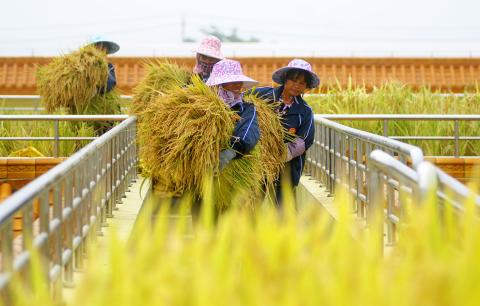Ever wondered why cultures can be so different, with Westerners more focused on the individual than people in the East? Psychologists said Thursday that the divide may come down to which crops are historically farmed in different regions.
This “rice theory,” described in the journal Science, holds that people who traditionally grow paddy rice become more collective and holistic over time because of the intense labor involved and the need for cooperation among neighbors.
In contrast, those who live in regions that grow wheat think more independently and analytically, in large part because the crop requires half the labor and not nearly the same need for cooperation as rice, researchers argued.

photo: REUTERS
“We propose that the rice theory can partly explain East-West differences,” said the study led by Thomas Talhelm, a University of Virginia doctoral student in cultural psychology.
“You do not need to farm rice yourself to inherit rice culture,” he added.
Since a host of differences exist between cultures across the world and could be linked to religion, politics, climate or technology, researchers decided to narrow their focus to China, where the Yangtze River roughly divides the wheat-growing north from the rice-growing south. Researchers tested 1,162 Han Chinese — China’s majority — students from six different locations using measures of cultural thought, implicit individualism and loyalty or nepotism.
Some tasks involved picking two related objects from a basic diagram of a person’s social circle; and dealing with friends versus strangers in a business transaction.
They found that people in rice-growing regions tended to choose more abstract pairings, while people from wheat cultures tended to pick more analytical pairs.
People from rice-growing regions tended to draw themselves smaller than wheat-region people when constructing diagrams of social networks, suggesting wheat people saw themselves as more important than others.
Those from rice provinces were also more likely to reward their friends and less likely to punish them, showing how the ties within the group prevailed in social and business interactions.
“It’s easy to think of China as a single culture, but we found that China has very distinct northern and southern psychological cultures and that southern China’s history of rice farming can explain why people in southern China are more interdependent than people in the wheat-growing north,” said Talhelm.
He said he first noticed differences in outlook and attitude while studying in China for several years from 2007.
Co-authors on the study came from Beijing Normal University, South China Normal University, and the University of Michigan, Ann Arbor.
The study also found evidence that more successful patents for inventions came from areas where less rice was grown, signaling a potential link between wheat growing and innovation.
“This doesn’t nail it, but is consistent with the broader idea and will no doubt drive much future inquiry,” said an accompanying Perspective article in Science by Joseph Heinrich of the University of British Columbia.

Following the shock complete failure of all the recall votes against Chinese Nationalist Party (KMT) lawmakers on July 26, pan-blue supporters and the Chinese Communist Party (CCP) were giddy with victory. A notable exception was KMT Chairman Eric Chu (朱立倫), who knew better. At a press conference on July 29, he bowed deeply in gratitude to the voters and said the recalls were “not about which party won or lost, but were a great victory for the Taiwanese voters.” The entire recall process was a disaster for both the KMT and the Democratic Progressive Party (DPP). The only bright spot for

Water management is one of the most powerful forces shaping modern Taiwan’s landscapes and politics. Many of Taiwan’s township and county boundaries are defined by watersheds. The current course of the mighty Jhuoshuei River (濁水溪) was largely established by Japanese embankment building during the 1918-1923 period. Taoyuan is dotted with ponds constructed by settlers from China during the Qing period. Countless local civic actions have been driven by opposition to water projects. Last week something like 2,600mm of rain fell on southern Taiwan in seven days, peaking at over 2,800mm in Duona (多納) in Kaohsiung’s Maolin District (茂林), according to

Aug. 11 to Aug. 17 Those who never heard of architect Hsiu Tse-lan (修澤蘭) must have seen her work — on the reverse of the NT$100 bill is the Yangmingshan Zhongshan Hall (陽明山中山樓). Then-president Chiang Kai-shek (蔣介石) reportedly hand-picked her for the job and gave her just 13 months to complete it in time for the centennial of Republic of China founder Sun Yat-sen’s birth on Nov. 12, 1966. Another landmark project is Garden City (花園新城) in New Taipei City’s Sindian District (新店) — Taiwan’s first mountainside planned community, which Hsiu initiated in 1968. She was involved in every stage, from selecting

The latest edition of the Japan-Taiwan Fruit Festival took place in Kaohsiung on July 26 and 27. During the weekend, the dockside in front of the iconic Music Center was full of food stalls, and a stage welcomed performers. After the French-themed festival earlier in the summer, this is another example of Kaohsiung’s efforts to make the city more international. The event was originally initiated by the Japan-Taiwan Exchange Association in 2022. The goal was “to commemorate [the association’s] 50th anniversary and further strengthen the longstanding friendship between Japan and Taiwan,” says Kaohsiung Director-General of International Affairs Chang Yen-ching (張硯卿). “The first two editions